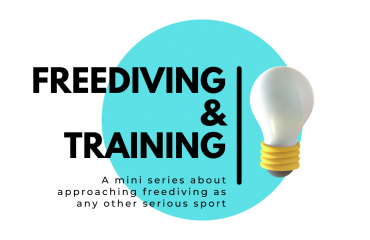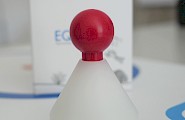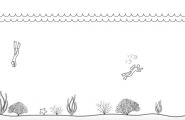4 June 2022
Freediving & Training: An essay about approaching freediving as any other serious sport
Freediving & Training: An essay about approaching freediving as any other serious sport
(by Silvia)
On a first date, freediving can be easily and enthusiastically tagged just as a sport: we learn how and so, we practice and train … yet, this is only the firstlevel of consciousness.
Deepening the knowledge, we reach a higher level of awareness, starting to consider freediving not a sport anymore: elevating it to the rank of a discipline. This change of perspective implies an subtle attitude, intuitively making space for freediving in our dailylife: way beyond increasing practice/training it starts soaking our choices, acts and even thoughts.
However, only if and when the engagement reaches the level of selfawareness freediving makes the quantum leap: jumping from an outer concept (sport/discipline) to the inner core of our bodymind. Freediving is thus accepted and internalized as part of our physical and psychological wellbeing and we are finally enabled to enter the amazing freediving holistic journey.
If we think of freediving as a sport, we have to go through the learning, practicing and training phases
Learning entails approaching:
- new techniques (DYN, DNF, …);
- new skills (e.g. being neutral at midwater – and being able to recognize when we are so while diving horizontally in a pool);
- procedures (e.g. correct way to breath in preparation to/out of a freedive, competition protocols…);
- safetyprotocols (e.g. never freedive alone, be the best buddy for your freediving companion, be knowledgeable on what to do in case of emergency…);
Next step is practicing what we have learned: execute & repeat create a ritual to fix the learned movements and skills: this helps to create confidence.
Continuous practice also creates capacity and self awareness, finally bringing those skills, capacity and abilities to a steady state.
Training brings the practice to a further level.
It starts with identifying and setting objectives while keeping in mind the law of true objectives – objectives must be S.M.A.R.T:
- specific (unambiguous, i.e. clear, well defined);
- measurable (criteria must be set to measure the progress toward each specific objective);
- achievable (challenging, yet not impossible: a hint of baldness never hurts though);
- realistic (within your reach and relevant to your life/journey);
- timely (set a timeline, with a start and an end at which the final measure will be made, and the objective reached!);
The necessary follow-up is planning the journey to reach the foreseen target(s).
The journey is made of paving the way brick after brick, passing through fatigue (‘any exercise-induced decrease in the ability to exert muscle force or power’ (Ref.: 10.1152/physrev.2001.81.4.1725 )) and, yes, also pain (‘an unpleasant sensory & emotional experience associated with actual or potential tissue damage’ as by the IASP Council).
Fatigue is unavoidable and objective while pain is always subjective.
Btw, did you know that pain tolerance can be increased with HIIT ?!? (Ref.: https://pubmed.ncbi.nlm.nih.gov/28879617/)
Why, or when, do you give up during a freediving performance?
Do you experience a sense of fatigue while freediving? And do you happen to reach the point of your maximum fatigue tolerance?
Not surprisingly, the brain is a largely uncontested contributor to fatigue in self-paced performances, and freediving indeed belongs to this kind. Thanks to our brainwork we continuously apply decisionmaking processes to every action of our existence: life is all about taking decision, and sport practice makes no exception.
We can deliberately make decisions (e.g. adjust the position at midwater when feeling too close to the surface/bottom in a pool) or it can happen unconsciously (e.g. pull-up with the dominant hand to start ascent during a deep dive).
The decision-making process in exercise performance is tuned by a number of factors, among which:
- Prior experience
- Motivation
- Presence of competitor
- External pressure
- Knowledge of your body physiological status
- Knowledge of environmental conditions
- Feedbacks from previous performances
- Exercise-induced pain or fatigue
Do you agree?
Do you believe you can train to control any of these factors, and thus improve your performance?
Can you think of any other variable playing an important role, at least in freediving? (Ref.: https://pubmed.ncbi.nlm.nih.gov/23717284/)
Have you ever heard about self talk ?
Self-talk is an internaldialogue we are continuously engaged in within ourselves.
It can be a single word or a more sophisticated assembly of thoughts. All this happens more often in a silent way, with no need to speak out loud or share with others.
Self-talk contributes to organizing our thoughts, planning our actions, consolidating memory and modulating our emotions: it plays an important role in productive decision making.
It can be a positive self talk aimed at psych-up, instill confidence, give instructions, cheers up….
Or it can be a negative self talk reflecting worries, disengagement, fatigue …
Are you aware of your self-talk?
How do you talk to yourself?
Do you ever talk to yourself while freediving? And if yes, in what terms? What are your magic words ?
Are you intrigued by your self talk and by self talk in general? Do you pay attention to your self talk?
Did you know that self talk has been widely researched and discussed in sport psychology for the past 30 years? The gist of the discussion hovering over self talk definition, conceptualization and classification.
A big distinction takes into account organic self talk vs. strategic self talk.
Organic self talk represents inherent thoughts, either spontaneously occurring self-statements athletes address to themselves (the so-called “I self talk”), or directed toward a goal, such as those occurring during problem solving and decision making.
All these thoughts are linked to the undergoing activity: it’s an emotionally charged reaction to a situation.
When it comes to the purpose of organic self talk, two distinct functions can be identified: instructional and motivational.
Istructional self talk takes advantage of statements related to specific skills we are endowed with, aimed at enhancing focus and technique correction and strategy-related commands to support for example the right execution of a movement.
Motivational self talk enhances performance by incresing self confidence, inspiring greater effort, and creating a positive mood. It offers support to calm nerves (arousal control), to feel prepared (mastery of skills) and to keep going (drive to action).
On the others side, strategic self talk represents a deliberate strategy aimed at facilitating learning processes and pushing performances through the use of specific cue words.
In this case athletes must stick to a plan and make use of previously agreed commands known by heart. Verbalization is thus prescribed (not a personal choice) and carefully positioned, occurring prior to and/or during the execution of an action. Content is pre-determined and it can be either instructional or motivational. Athletes are trained to make use of specific cue words triggering specific responses. The entire process is based on memory.
How does your organic self talk develop during a freediving performance?
What kind of self-talk you prefer? Organic or Instructional?
Do you favor automatic answer to what happens during a performance or do you carefully study and plan specific cue words aimed at triggering the desired response?
(Ref.: Latnjac et al. Speaking Clearly…10 years on: The case for an integrativce perspective of self-talk in sport, 2019)
Have you thought lately about self talk and specifically about your own self talk ?
Time for a more detailed analysis of your self-talk... Find a comfortable position and take your time to answer the following questions… and if you are not able yet to answer all of them, don’t worry: you can go back to your paper after each freediving performance.
How is the volume of the voice inside your head? Is it loud or does it speak softly?
Is it a I self talk (using pronouns such as I / me / my or do you speak to yourself as a third person (using pronouns such as you / he / she / it / first or last name)?
What’s the origin of your self talk? Is it an automatic answer to the undergoing play or is it the perfect execution of a finely tuned plan?
What if the function of your self talk? Do you give yourself instructions or use motivational cue words ? And what are the most recurrent ones? Do you have different cue words for different phases of your performance?
Is there any dynamic interplay between your instructional self talk and motivational self talk ? Do you usually switch between the two? Are you aware of specific switches?
What is the valence of you self talk? How can the content of your inner thoughts be classified? Are those positive or negative thoughts?
Becoming aware of our self talk and the patterns it takes when facing challenging situations is an important step toward taking control over our actions.
During freediving our inner voice becomes louder, partly because of lack of external noise and distractions. Our thoughts flow easily out and can be pinpointed, analyzed and readdressed to confirm the pattern or make adjustment in case of need.
Self talk can also take unexpected turns for time to time… it not bad or good: it just happens and it is interesting to point it out and try to connect the dots between actions and thoughts.
Self talk analysis is a never ending task: when done systematically it helps to monitor the outcomes.
Happy and safe dives everyone!









